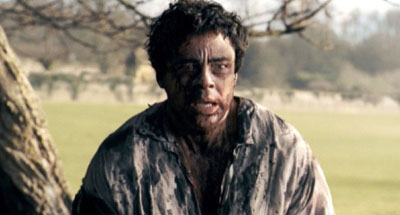 A remake of the Universal Pictures classic creature feature The Wolf Man, starring Lon Chaney Jr., seems spawned from little more than some out-of-touch studio executive banking on the Twilight sequel ushering in werewolves as the new vampires and the lazy notion that any movie made pre-CGI sure could use a reboot.
A remake of the Universal Pictures classic creature feature The Wolf Man, starring Lon Chaney Jr., seems spawned from little more than some out-of-touch studio executive banking on the Twilight sequel ushering in werewolves as the new vampires and the lazy notion that any movie made pre-CGI sure could use a reboot.
Joe Johnston’s remake seems more indebted to a spat of early ’90s adaptations of classic Victorian horror novels, beginning with Coppola’s Dracula, and ending two years later with De Niro mugging as Frankenstein in Kenneth Branagh’s eponymous film. Though the former has its merits (as well as a soft spot in this writer’s stone cold heart), these films set a pretty low standard for the Victorian-era gothic horror remake/adaptation sub-genre.
So, given this film’s dubious timing and untenable potential, how’d it fare? Bright side, the set and costume design, if a little monotone, are exceptional. Talbot Manor is both grand and extra creepy, and the costumes seemed period appropriate to my untrained eye. Down side, these details are powerless to create the proper atmosphere without a skilled eye to film them. All too often, the beauty of a scene is marred by its tight framing or missed by an erratic quick pan that degrades the suspense to cheap scares and jump moments. Five false scares in the first 15 minutes and you expect me to give a cuss when the werewolf finally shows up? What is this, the film that cried wolf? Man.
Equally essential to mood and atmosphere is a script and its purveyors, which is bad news for audiences of The Wolf Man. The film runs through expository scenes like men fast forward through porn, anxious for some action. Unless I’m mistaken, this movie’s aim is to get under my skin, more than just gross me out or make me flinch at loud noises, but I can’t be unsettled if I’m not first settled into the story and characters. Del Toro plays Lawrence, an actor in New York returned to his London home after the mysterious brutal murder of his brother. Anthony Hopkins once again dons his crazy pants as Lawrence’s loony and distant widowed father. Emily Blunt is the brother’s widow and Del Toro’s obvious love interest. The script lays these dynamics out quickly and bluntly and the actors’ readings are resultantly un-nuanced.
This film’s only saving grace could’ve been the wolfman himself.
Unfortunately, this film blows its load in the first act. The quick pans mentioned earlier actually serve to obstruct any clear image of the monster, heightening the suspense and mystery behind the dismembering, disemboweling and decapitating. And then the film falls flat. The story fails to hold any interest till the next werewolf scene. Then, the transformation scenes lack the painful visceral feeling of animatronics (alas, I am a child of the ’80s), being about 90 percent CGI. And the repressed animalism in humans, ostensibly what this film is all about, fails to come across because human qualities in the wolfman are also absent. Del Toro’s rage is poorly conveyed as both human and monster. My rage, however, is overtly apparent.
Hugo Weaving gives a decent but pointless performance as a Scotland Yard detective, but the film is recommended only as further evidence of Anthony Hopkins becoming a wider, less respectable mockery of his former self, a process known as Brando-ization.













